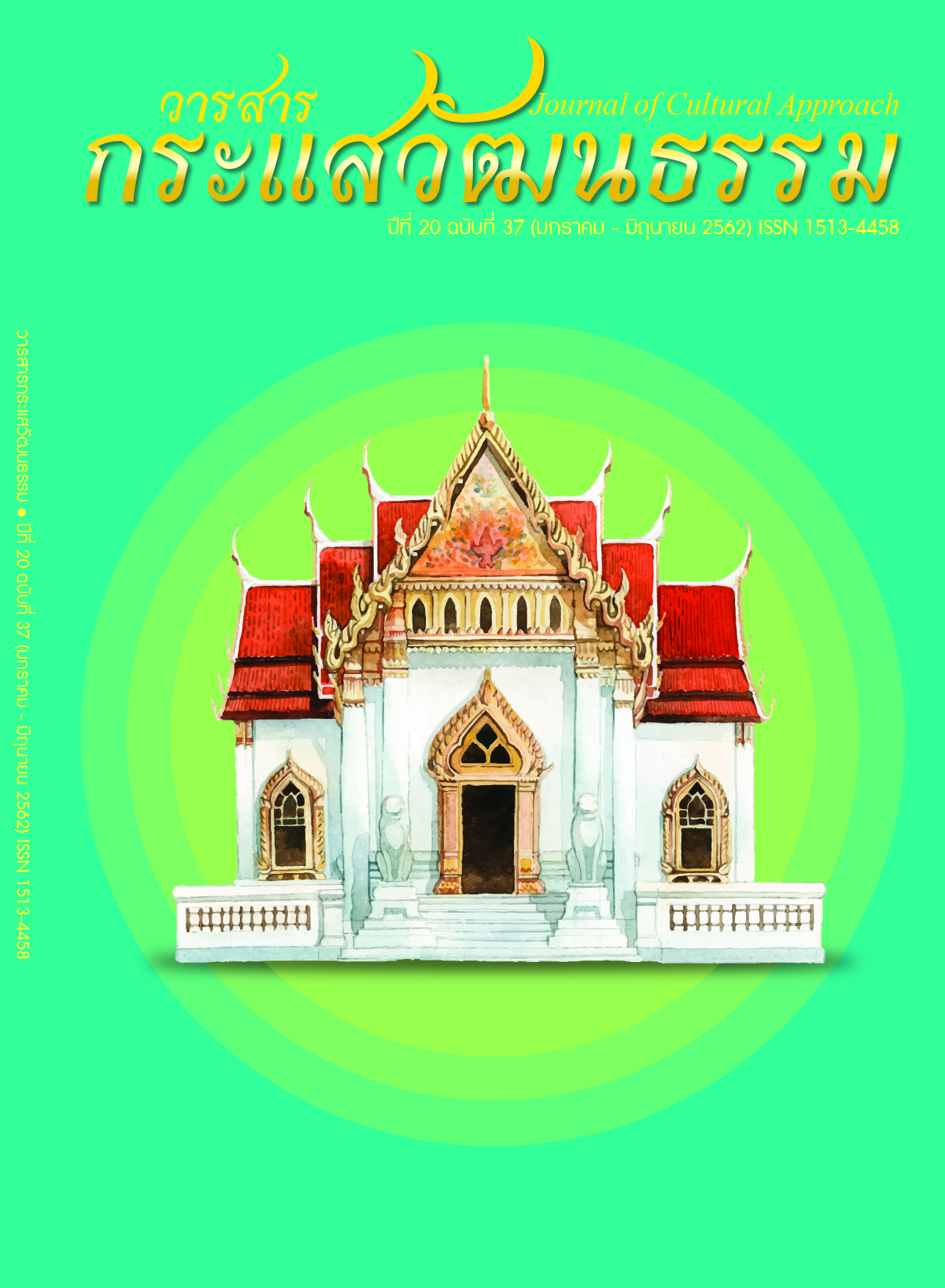King’s Science: Buddhist Integration of Modern Science for Thai Society at All Levels
Main Article Content
Abstract
This article is about the king. This is an important work of His Majesty King Bhumibol Adulya–dej, who was born from the royal dignitaries in his work to help the people. King science is a science that contains many knowledge. The most important is the philosophy of Sufficiency Economy. Based on the principle of the Middle Way or the middle line in Buddhism. It is a direct integrated Buddhist linkage to solve the economic problems and the well–being of the Thai people. Because of this, King Rama is considered to be the most important science in the era when Thailand is in a state of strategic drive to manage the country to Thailand 4.0. Equivalent to other countries. And innovative modern Buddhist philosophy of modern Thai society at all levels. This article is about the king. This is an important work of His Majesty King Bhumibol Adulya–dej, who was born from the royal dignitaries in his work to help the people. King science is a science that contains many knowledge. The most important is the philosophy of Sufficiency Economy. Based on the principle of the Middle Way or the middle line in Buddhism. It is a direct integrated Buddhist linkage to solve the economic problems and the well–being of the Thai people. Because of this, King Rama is considered to be the most important science in the era when Thailand is in a state of strategic drive to manage the country to Thailand 4.0. Equivalent to other countries. And innovative modern Buddhist philosophy of modern Thai society at all levels.
Article Details
Proposed Creative Commons Copyright Notices
1. Proposed Policy for Journals That Offer Open Access
Authors who publish with this journal agree to the following terms:
- Authors retain copyright and grant the journal right of first publication with the work simultaneously licensed under a Creative Commons Attribution License that allows others to share the work with an acknowledgement of the work's authorship and initial publication in this journal.
- Authors are able to enter into separate, additional contractual arrangements for the non-exclusive distribution of the journal's published version of the work (e.g., post it to an institutional repository or publish it in a book), with an acknowledgement of its initial publication in this journal.
- Authors are permitted and encouraged to post their work online (e.g., in institutional repositories or on their website) prior to and during the submission process, as it can lead to productive exchanges, as well as earlier and greater citation of published work (See The Effect of Open Access).
Proposed Policy for Journals That Offer Delayed Open Access
Authors who publish with this journal agree to the following terms:
- Authors retain copyright and grant the journal right of first publication, with the work [SPECIFY PERIOD OF TIME] after publication simultaneously licensed under a Creative Commons Attribution License that allows others to share the work with an acknowledgement of the work's authorship and initial publication in this journal.
- Authors are able to enter into separate, additional contractual arrangements for the non-exclusive distribution of the journal's published version of the work (e.g., post it to an institutional repository or publish it in a book), with an acknowledgement of its initial publication in this journal.
- Authors are permitted and encouraged to post their work online (e.g., in institutional repositories or on their website) prior to and during the submission process, as it can lead to productive exchanges, as well as earlier and greater citation of published work (See The Effect of Open Access).
References
[2] Bureau of the Royal Household. (1999). The New Theory: Sustainable Land and Water Management Approaches. Retrieved August 29, 2017, from https://web.ku.ac.th/
king72/2542–09/res05_02.html. (in Thai)
[3] Chacariyanuyok, Nada. (2016). 9 Innovation Originated By King Rama the 9th Prove Alleviating the Great Innovators of the Century. Retrieved September 2, 2017,
from http://mcfiva.com/blog/9–innovation–by–the–King. (in Thai)
[4] Faculty of Engineering, Kasetsart University. (2007). Phraboromdhammikaraja (Royal Dhama). Bangkok : Bureau–Kasetsart University Press.
[5] Mookpadit, Manoon. (2006). An Analytical Study of H.M. the King’s Sufficiency Economy Philosophy and Buddhism. Bangkok; Mahachulalongkornrajavidyalaya University Press.
[6] Office of the National Economic and Social Development Board. (2011). Developer King for the Benefit of Thai Citizens, Bangkok: Petchroong Printing Center.
[7] Office of the National Economic and Social Development Board–NESDB. (2014). The Diagram Shows the Concept of Sufficiency Economy “3 Loop 2 Conditions”. Retrieved September 1, 2017, from http://s14name.blogspot.com/2014/03/. (in Thai)
[8] Osathanugrah, Akkarawat. (2006). One of the Great King of the World. Bangkok: Publishers Join Together.
[9] Panya, Chanisara. (2014). Sufficient Economy. Retrieved September 1, 2017, from http://s14name.blogspot.com/2014/03/. (in Thai).
[10] Pornsak, Pongpoew. (1981), Political Science and Development. Bangkok: Sri Anan Printing House.
[11] Pramoj, Kukrit. (1982). “Thai Society” in Thai Character, Region 1. Bangkok: Publishers Thai Wat-tana Panich.
[12] Research Management and Quality Assurance Division. (2016). Thailand 4.0 Models Drive Thailand to Sustainable and Sustainable Wealth. Retrieved August 29, 2017, from http://www.libarts.up.ac.th/v2/img/Thailand–4.0.pdf. (in Thai).
[13] Sakworavit, Anon. (2017). The King of Information Sciences. Retrieved August 29, 2017, from https://goo.gl/uscD4H. (in Thai)
[14] Senanarong, Ampol. (1999). His Majesty with the Management of Agricultural Production Resources. Retrieved September 1, 2017, from https://web.ku.ac.th/king72/2542–09/res05_02.html. (in Thai)
[15] Suwantip, Weerayut. (2010). King’s Science: the Concept of Wisdom Leads to Action. To Make People into People. Bangkok: Publisher Moral and Moral Promotor Center Office of Knowledge Management and Development (Public Organization).
[16] Tantivejkul, Sumeth. (2011). National Development His Majesty the King. Bangkok: Diamond Printing Center. Petchroong Printing Center.
[17] Trueplookpanya, (2012). King of Innovation–King Rama IX. Retrieved August 29, 2017, from https://goo.gl/sKszAk. (in Thai).
[18] Wasee, Pravet. (2003). Strategic Buddhism and Thailand Development. Bangkok: Komomol Khomthong Foundation Press.


